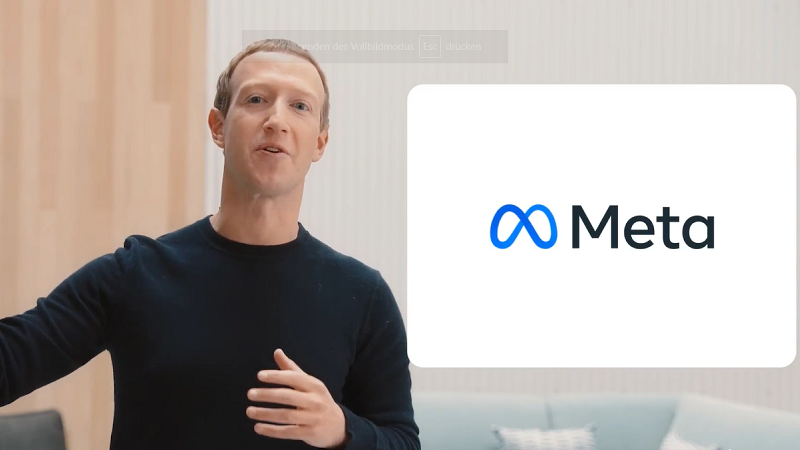At today’s Facebook Connect event, company CEO Mark Zuckerberg unveiled his vision for the group’s (virtual) future and the company’s new name. Facebook’s new name is now…
Meta!
Facebook CEO Mark Zuckerberg announced this with visible joy at the end of his keynote at today’s Facebook Connect event. The new name is meant to reflect the future direction of the group and its new tech focus: the virtual Metaverse.
Facebook’s new name is Meta
Mark Zuckerberg’s keynote speech was therefore less a presentation of new products and more a vision of the future. Accordingly, many of the presentations were ongoing research projects or targets for what the metaverse might look like in five to ten years.
In addition, the name Facebook no longer fits. Social media apps such as Instagram, WhatsApp and Facebook will continue to exist, and they will continue to keep their names. But that is no longer what the group as a whole stands for. Therefore, he said, the brand wants to represent its new direction with a new name. So Facebook’s new corporate name is Meta.
And with it comes an entire virtual meta-verse, the Metaverse.
Welcome to the Metaverse
In the Metaverse, a world with a mix of virtual and augmented reality, there will be four major areas: Work, Home, School and Leisure.
Some of these visions already exist in initial variants on the company’s Horizon platform, such as Horizon Workrooms, Horizon Home and Horizon Worlds. But it now wants to take these technologies to the next level.
Basically, the company wants to make the virtual reality (VR) of these worlds as real as possible in the future. So instead of staring at screens as before, the VR experience in the future will be lifelike, immersive and give “a sense of real presence,” Zuckerberg said.
Working and learning in the metaverse
Imagine being able to create an office environment in a virtual world where all employees can meet in the form of avatars, just like in real life, and also have access to all the important tools they need to work.
This is roughly what the working world in the Metaverse is supposed to look like. This could bring the home office together with work in the office (and human proximity), creating entirely new ways to work.
This could bring new economic opportunities, Zuckerberg philosophizes. After all, if you can work from anywhere and be present (in virtual form) at the same time, you open up new spaces for business.
For the future of e-learning, the developers envision an immersive experience in which the curious can travel back in time to ancient Rome and see how buildings were constructed in that era. Currently, the company has invested $150 million in up-and-coming talent to create immersive learning content, Zuckerberg said.
Gaming in the Metaverse
The other big future area for VR technology is, of course, gaming. This includes both computer games and traditional physical games, as well as various leisure activities.
Mark Zuckerberg presented various visions of the future in this regard. In one simulation, two men played virtual chess with each other, one in New York, the other in Barcelona.
In another simulation, Mark Zuckerberg surfed virtual ocean waves in a game world he created himself. And in yet another simulation, several friends (as avatars) met to play virtual basketball.
Metaverse replaces social media
In Mark Zuckerberg’s vision, the Metaverse also creates new possibilities for social media that could replace the current 2D world of apps and smartphones. Creators could create virtual spaces and experiences for their fans and followers and interact with them much more directly here, it said.
A band, for example, could give a concert and experience it in the VR world – and charge an entrance fee for it. Fans, in turn, could experience the music up close and personal from their living rooms.
Influencers, in turn, could organize special VIP events for selected fans or sell exclusive products. Terms like NFT or cryptocurrency never came up directly, but one can certainly imagine how these technologies could be integrated into a virtual fan world.
All still dreams of the future
However, the company is still years away from all these possibilities with its current technologies around VR and AR (augmented reality).
But the goal is clear. In the coming years, the headsets and glasses, as well as the simulations, should make VR and AR experiences even more real, even more realistic and even more immersive.
At least this much has already been revealed: In the coming year, users can look forward to a new headset and more games, among others in the Quest universe.
Interestingly, and probably also due to the increased political pressure on the company, Mark Zuckerberg also took time this time to talk about the privacy and security of his new technologies.
Privacy and security: Everything different this time
Mark Zuckerberg emphasized several times during his presentation that the Metaverse will be created around user privacy and security. This time, Zuckerberg said, they want to do things differently than before.
“This time we want to take the time to consider privacy,” Zuckerberg said, emphasizing that the new Metaverse will be transparent. That will likely include comprehensive information about how personal data is collected, stored and used.
There will also be more privacy settings and age restrictions for young users. At the same time, the Metaverse is to become more inclusive and a space for “all people. Mark Zuckerberg said that human rights organizations are currently being consulted on this. And: You should no longer have to log in to the Metaverse with your Facebook account.
The message is clear: Meta wants to create a wonderful new virtual world for everyone – and thus also move away from Facebook’s negative image.
Metaverse: More questions than answers
That sounds good, but with so much vision for the future, it is at the same time difficult to assess what the concrete implementation will be like.
Will users have to pay for expensive hardware? What insights will Metaverse avatars have into our privacy and how can it be protected? And how do you protect privacy in a virtual world?
What currency and technology should the Metaverse ecnomy run on? Could there be a separate Metaverse cryptocurrency? Will it be an open source system? Or will Meta, like Facebook does now, retain rights to content on the platform?
It’s already clear: The Metaverse could open up previously unimagined opportunities for all of us, but it could also create many new problems. And so far, there are more questions than answers. At least Mark Zuckerberg has answered one question: Facebook’s new name is now Meta.










